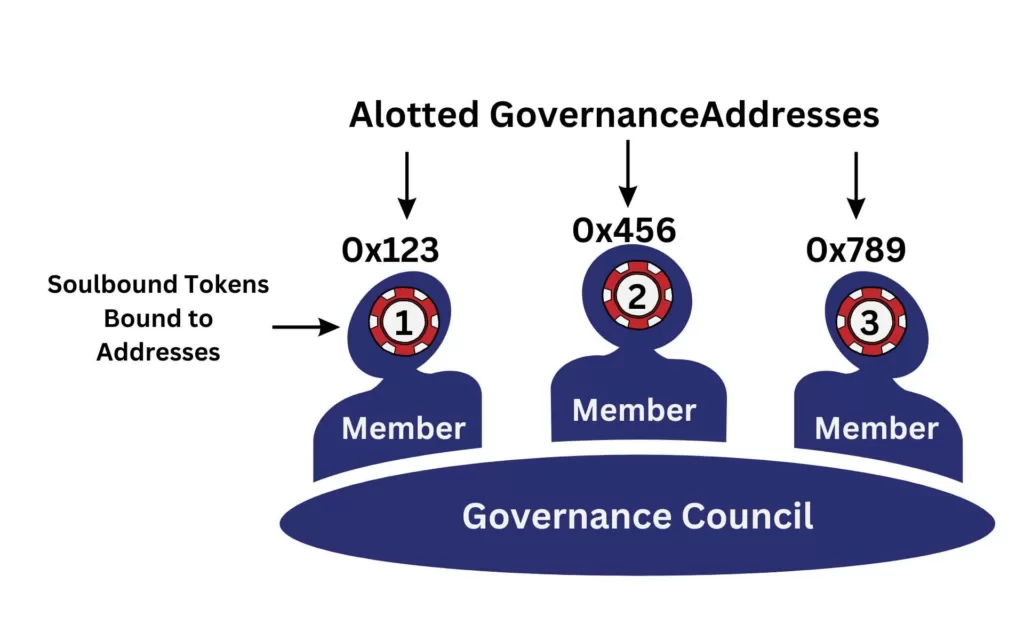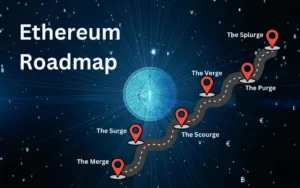Soulbound Token is a digital Identity verification method where a crypto token similar to an NFT is attached to a Web3 wallet on a permanent basis. This helps in identifying a particular wallet and associate it with an individual or an entity.
The concept of Soulbound Tokens were first proposed by Vitalik Buterin in an article where he talks about the concept of such NFTs.
Table of Contents
1. History
The concept of soulbound was first presented by Vitalik Buterin through a post on his website on Jan 26, 2022. He took the idea from the World of Warcraft game where “soulbound items” if picked up could not be transferred to other players.
He also authored a paper with E. Glen Weyl, and Puja Ohlhaver, on the same topic sometime later in May 2022.
2. How Do Soulbound Tokens Work?
Soulbound Tokens are similar to other tokens but they stick to wallet addresses on mint.
A smart contract controls their generation. Upon minting they are bound to the wallets that mint them or specific addresses, if the smart contract supports this feature.
The reason why they remain soulbound is that their “transfer function” is not present in the smart contract which created them.
Here is a sample code with detailed explanation of Soulbound Token Code and it is written in Solidity 0.8.9.
2.1. Are They Permanent?
Yes, soulbound tokens are permanent but only as long as you want them to be. But some of them can be destroyed from a wallet which hosts them.
2.2. Soulbound Token Standards
Several blockchains have started working on Soulbound Tokens, some of them are Ethereum, BNB Chain, Polkadot, and a few others.
In Ethereum, ERC-721 and ERC-1155 NFT token standards can be modified to make soulbound tokens with backwards compatibility.
However, there are two more soulbound token standards on Ethereum. ERC-5484, Consensual Soulbound Tokens are also available and have passed all reviews. Further, there is another token standard called the ERC-5114 Soulbound Badge on Ethereum, but, it is currently under review.
3. Examples of Soulbound Tokens
3.1. ERC 5114 Soulbound Badge
Ethereum’s Soulbound Badge (ERC 5114) implements the soulbound capabilities on Ethereum and other EVM compatible blockchains.
However, the EIP related to this ERC is not final yet and in under review stage.
3.2. Binance’s BAB Token

Binance Account Bound Token or BAB Token is allotted to those users who have completed their KYC on Binance. These tokens will be issued to addresses that you own and addresses that you have provided in your Binance account as your own.
It is minted on the BNB Smart Chain.
The BAB token has a feature that helps you recover it in case you lose your access to the wallet or the token. If you somehow lose your BAB token, you can use your Binance account to revoke its minting and mint a new one after 72 hours.
3.3. Polkadot Manta Token
Project Manta on Polkadot has launched zero-knowledge Soulbound Tokens that provide digital identities on the Polkadot network. These soulbound tokens would also help identity verification in Web2.
The project has been initiated in collaboration with Linea, a rollup-based scaling solution.
4. Applications and Usage
Soulbound Tokens have a wide range of current as well as potential applications in the future. Currently, they serve as wallet identifiers in Web3 like Binance Account-Bound Token. In the future they can act as:
- Record of Achievements
- Proof of Education
- Skill Records
- Blockchain Governance
4.1. For Individuals
Individual usage of SBT to create digital identifiers have a huge potential in the near future.
4.1.1. Digital Web3 Identity
A data by Venture Beat shows that Web3 ecosystem lost $3.9 billion to fraud. Several companies are working towards establishing a digital identification methods to reduce financial crimes in Web3.
ShareRing is a project that is currently innovating in digital identity space to make Web3 more secure.
4.1.3. Proof of Education
Educational certificates could be issued on blockchain using soulbound tokens. If these tokens are connected to each other using their addresses, they can act as a verifiable proof of education.
Currently, the only method of educational verification is sharing scans of physical certificates which are easily forged with the advancement in AI and worldwide availability of high quality printers.
However, there has been some developments.

In December 2021, Indian Prime Minister Narendra Modi issued blockchain-based graduation certificates to students of premier engineering institution IIT Kanpur. The certificates were issued on the event of 54th convocation in the institution.
4.1.4. Lifelong Skills Record

Soulbound Tokens can record skills as soon as a professional acquires them. The immutability of blockchain will help preserve these skills forever and will record life long learning experiences.
Cred3 is a project that has created an application of using a soulbound token to record skills, certificates and achievements. I am also involved in the project to develop comprehensive content for the platform.
Skills can be added as soulbound tokens which then can be verified by just sharing the wallet address. Employers can easily see which skills (as soulbound tokens) are present in the wallet.
4.1.5. Blockchain Governance
Vitalik discussed about using these tokens in governance. His idea was that for a system to be sufficiently decentralized, its governance has to be widespread. Transferable governance allows the concentration of power if any wealthy person or party can afford to buy tokens even at elevated prices.
They can also offer protection against attacks on DAOs which rely on the coins to get voting power. If anyone gets illegal access to tokens or is able to hack governance member’s wallet, they can easily influence decision making.
Soulbound technology can help establish the identity of real governance council.
But what if someone does not wants to partake in governance after some time or they want to quit?
The answer is simple, governance could be exercised using wallets or addresses which will not be personal. It will be akin to the board of directors in a company. Each member of the governance council will have a unique address associated with them which will let them exercise their governance power.

In this case a wallet or address is akin to a rubber stamp allotted to the board of directors..
If they leave the council, they would relinquish the control over that wallet which can be taken
4.2. For Institutions, Firms and Companies
Institutions can use soulbound tokens for corporate governance, issue blockchain based voting for board of directors and also record senstivie conversations.
A good application of soulbound tokens can also be to mint legal contracts on the blockchain.
5. Pros and Cons
Some benefits of using Soulbound Tokens in regular life are:
- Easy verification of skills, talent and education.
- Minting work experience using SBTs with employer as a co-signer.
- Undeniable proof of achievements.
- Easy access to the list of skills acquired for tracking and building upon older skills.
However, there are a few challenges too:
- Soulbound Tokens currently do not have a proper working token standard. The Ethereum Token standard is very less known. Also, modification of NFTs for making SBTs could expose them to security issues.
- There has been no large scale testing which leaves possibility for pitfalls that are not yet discovered.
- Even if their applications are great, people not working with blockchain would still find it difficult to use them.
6. Frequently Asked Questions
Can I delete a Soulbound token?
Yes, soulbound tokens can be deleted from a wallet. You can remove its private keys, hide the token (in MetaMask) or remove the network on which it is present (not recommended).
Can I edit a Soulbound Token?
The only way to edit such a token is to remove it and re-mint it.
Are there any risks associated with Soulbound Tokens?
A risk associated with Soulbound token is that if you decide to change your career, it would be difficult to hide you past skills since they would be on your wallet. Further, changing the work identity wallet would mean a loss of past achievements.




